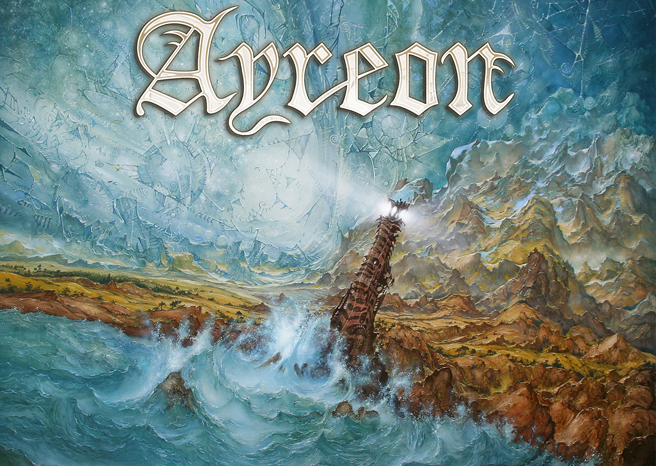Ayreon is the flagship musical project by Dutch composer and multi-instrumentalist Arjen Anthony Lucassen.
As with every Ayreon album, ‘The Theory Of Everything’ is a concept album with each character being portrayed by one singer. Singers on this project include former King Crimson and current Asia member John Wetton, Marco Hietala of Nightwish and Tarot, Cristina Scabbia of Lacuna Coil, and Tommy Karevik of Kamelot and Seventh Wonder. The album also features various guest musicians such as keyboardists Rick Wakeman (ex-Yes),Steve Hackett (ex-Genesis), Keith Emerson (ex-Emerson, Lake & Palmer), and Jordan Rudess from Dream Theater.
According to Lucassen, the album is “four long tracks divided into various segments” … there are 42 segments. Isn’t that the answer to life? (According to The Hitchhiker’s Guide to the Galaxy.) Stephen Hawking wrote that, even if there was a theory of everything, it would not necessarily be a set of equations presented on a white- board:
“What is it that breathes fire into the equations and makes a universe for them to describe?”
[The Mind of the Universe.] So why have great thinkers ( from Plato to Whitehead ) sought to describe our shared reality as a system that can be safely calculated and placed into a formula? Maybe it’s because we all share the desire to rationalize what we see and experience around us. And we also share the only real fear – fear of the unknown.
The first movement in the song cycle (‘Phase I: Singularity’) starts with ‘The Blackboard.’ A rubbery bass bounce sits low against a sea-spray of infinitely higher sounds to open up this piece. Then a delicate guitar launches the words of ‘The Teacher’ (JB). It acts as a fire-dog … desperate to keep the unearthed and earthed together – to tighten the focus of existence. Petalled softly against his words are ‘The Girls’ own soft curls (Sara Squadrani – Ancient Bards.)
Rick Wakeman’s keys are strident on ‘The Theory of Everything part 1’ – the rapidly expanding keynotes mathematically uniting the expressions of the numbers with the far more spiritual world of music. Although the notes are well-formed (and played with excited vigour) – and they even naturally achieve an (almost) arithmetic self-control and balance – they are still ‘only’ musical vibrations. As such – and ordained by the gods – the mystical properties of sound are subject to the winds of heaven; They cannot be bound by mathematics. It is great to have those grand-magicians Wakeman and Emerson back on their legitimate thrones. Explaining these intricate ideas with their fingers of fire.
Overworked yet assiduous, The Prodigy shakes and stews over the unfathomable dimensions of his problems – in ‘The Prodigy’s World.’ We are reminded here that Prodigies are often savants. They may suffer non-severe forms of autism – often characterized by impaired abilities to interact socially (think of Dr. Sheldon Cooper in ‘The Big Bang Theory’.) It is often said that prodigies retreat back into the relative comfort of their own puzzled minds – to escape the imperfections and eccentricities of life. But, unfortunately for them, life itself cannot be rationalized. It can only be experienced. (Many a plot in the ‘The Big Bang Theory’.)
‘The Teacher’s Discovery’ allows us to glimpse into the perplexed world of an incredulous teacher who has just been out-smarted and out-classed by his own student. It reminds us of the struggle of minds. These sometimes occur between two giant intellects – often between a bright apprentice and his/her diminishing master. Sooner or later, every successful apprentice become the master. And the cycle continues. There are obvious parallels to Plato / Aristotle in this concept – but music lovers will also be reminded of the fictional relationship between Salieri and Mozart. As the prodigy Tommy Karevik ( Kamelot) prudently apologises – very humbly – for his intrusion into superior intellect: “Numbers just appear before my eyes…” He leaves the teacher struggling with the twin demons of envy and jealousy in his sceptical mind.
Amidst smoky uilleann pipes (from Troy Donockley – Nightwish) we reach ‘Love and Envy’ and a plateau of sane sounds – before we are introduced to the ominous rivalry that develops into ‘Progressive Waves.’ This is a dizzying kaleidoscopes of sounds and textures – a myriad turbulent vortices tumbling in a darkened space. They call forth the knotting twists and the corrupting turns of a perverted and distorted – yet innocent – mind.
With ‘The Gift’ we are introduced to ‘The Psychiatrist’ (played by John Wetton – Asia) who discusses The Prodigy’s gifts. But the flip-side of the boy’s character is also revealed at this time:
“He just sits there – lifeless – for hours at a time… no expression on his face… His eyes staring into space.”
The Prodigy reminds us of the character of ‘Tommy’ (from Who’s rock opera) the little boy who “didn’t hear it/ didn’t see it” – his fragile mind fractured by the intensity of existence.
Without getting too deeply into theoretical physics here, as listeners we can nevertheless appreciate any attempt to capture the magical concept of the ‘Eleventh Dimension’. This is the proposed “master theory” that unifies the five super-string theories (M-theory) and gets us as close-as-can-be-dared to that elusive and self-embracing ‘Theory Of Everything’. The strings are baggy on this track. Like slack-line webbing – stretched and bounced across oscillations. The woodwind sounds (Jeroen Goossens – Flairck) and later the violin bleats (Ben Mathot – Dis) are sedate and mournful – yet they flicker playfully like tongues of fire on drying embers. A blinding star-burst of silvery sounds then rises to create a white-out of cataclysmic delight.
There is a return to form for Rick Wakeman on this album. Those who have long wished for something similar to 1973’s sublime ‘The Six Wives of Henry VIII’ only need now immerse themselves into this album to have confidence in his lasting abilities. ‘The Theory of Everything part 2’ closes Phase One of this song cycle. Amid skirls and whipped beats, Arjen’s own bass guitar gurgles, growls and fluctuates – and the intensity is multiplied to an astonishing level.
‘Phase Two: Symmetry’ starts with ‘The Consultation’ – and an image that once again reminded us of The Who opera ‘Tommy’ (when the Walkers take Tommy to a shrink and the doctor instructs the boy to “Look in the mirror.”) The ‘Diagnosis’ is a rocky number with squirming organ notes and rugged guitar chops. It’s an agreeable piece – the head-banging rhythms will be a treat for those in the audience less inspired by the constructs of Musical Theatre. The ‘Diagnosis’ moves smoothly and uninterrupted into ‘The Argument’ where the audience is asked to face the uncomfortable proposition that the The Psychiatrist will need to experiment on the boy. It seems that everyone wants a piece of his dazzling intellect. They all wish to take something from it. Every character has his/her own secret desires and they will machinate until they make their own dreams come true. They all want to share in that glory – no matter what the cost. And like the Teacher, we also have to come to terms with the fact that some stars might shine less brilliantly in the heavens – now a new hyper-nova has been ‘born’.
‘Quantum Chaos’ has a rapidly blinking beat and a spattered texture. But an acute melody rises from the drizzled splashes. This sounds like the spiralling tentacles of a giant cephalopod rising from the inky deep. This track is very reminiscent of ELP. Other highlights from this portion include the charismatic rise of ‘The Prediction’ – with each princely step of sound – it rises itself higher towards the paradise of the paradigm.
CD2 and ‘Phase Three : Entanglement’ opens with ‘Fluctuations’ and begins with a quick burst of synth – blasted out against sizzling chords. A dark riff emerges, as a pliant rhythm exposes the vocal – this is like broken bark allowing sticky syrup to run free. ‘Transformation’ is an elegant mix of luscious organ sounds and rummy bass notes. This leads to the inevitable ‘Collision’ when the flying sounds remind us of fundamental particles colliding with each other. We recall our own experiences, and we remember that life can also present us with similar collisions. For example, what we have previously defined as indivisible (maybe a relationship) suddenly becomes exposed as fundamentally broken and shattered … even empty.
‘Side Effects’ wallows like a sick whale in a poisonous sea. An intensely allegorical synth-line gathers strength against the slimiest of algal piano notes. The Psychiatrist warns against further treatment. The Father (played by Michael Mills – Toehider) admits to his son that he has been treating him with a dangerous drug. A moogish synth snarls and seeps around this rancorous news, like a bloodhound irritated at having lost the scent. It bites into the remaining caustic rhythms with an air of efficiency.
‘Magnetism’ then reminds us very much of the instrumental “Last of the Wilds” by Nightwish (2007) on their ‘Dark Passion Play’ album – with Michael Mills (Toehider) on Irish Bouzouki. ‘Quid Pro Quo’ then continues with this spiritual Celtic theme. The pipes play wistfully, twisting out across a vapid landscape. Then, against an horrific, vile and darkly sinister sound – the plot changes course – creating a tense new under-current of woeful magnitude.
‘Phase Four: Unification’ begins with a lament on the cello (Maaike Peterse – Kingfisher Sky) and the ‘Mirror Of Dreams’ offers us a strikingly beautiful duet. This is followed up by a ripe bass thumbed against a chortle of guitar strings, and a chattering of rhythms. ‘The Lighthouse’ offers a place of solitude for the protagonist. ‘The Lighthouse’ is carefully chosen as a haven. Yes, it can be isolated and secure. But it also indicates its existence very boldly – in order to obtain the maximum effect. The remoteness of this piece is dramatically shattered by the second ‘Argument’.
‘The Parting’ is a song full of feeling. A grimace – a fake smile – and a nod of acceptance. The voice is pristine and proud – and it soars away … above the generous orchestration below. Although the arrangements in this piece reminded us of work by Danny Elfman – we were soon soothed by the illustrious guitar-play from Steve Hackett (Genesis). This begins to settle our mood and takes us from film-score territory and into a far more familiar prog -rock landscape. Very similar, in fact, to the work of Jan Akkerman on the second part on ‘Moving Waves’ (Focus 1971.)
After the ominous ‘Visitation’ with it’s cluttered beats and wide smears of sound, the meeting of minds is revealed. And so we are neatly coaxed towards ‘The Breakthrough’. The lyrics on this track take on magical proportions – as the secret words of physics almost become a Druidic incantations. And through these magic words the next level is reached. “Science has evolved / The Mystery… solved”. And the final movement reaches its poignant conclusion with ‘The Note’.
The ‘Uncertainty Principle’ has it that the measurements of certain systems cannot be made without actually affecting the systems being observed. So, by examining a thing closely – we might be forming a relationship with that thing – and thus inadvertently influencing the outcome. The ‘Theory of Everything part 3’ is not, therefore, a dénouement – or an unravelling – but a tightening of all the constraints that keep us all in place – the characters – the musicians – the public. We are all connected by the ‘Uncertainty Principle’. Perhaps, then , this is the ‘Theory Of Everything’ – and that’s how it can finally be explained. A sense of completeness. Cohesion and unity.
Our experience of this huge piece of music will be personal. Clearly, we will enjoy the movements as they are intended – as a triumphant piece of musical theatre. But we might also ponder the many implications that each segment reveals.
This is a wonderful and engaging opus, from one of the truly great masters of progressive rock. Brought to life by an extraordinary collection of some of the greatest talents that live on the planet. You will experience this and re- live it. Time and time again.
Ayreon ‘The Theory Of Everything’ will be out on the 28th October 2013 via Inside Out Music.




















[…] ramzine.co.uk https://beta.ramzine.co.uk/features/ayreon-the-theory-of-everything/ […]